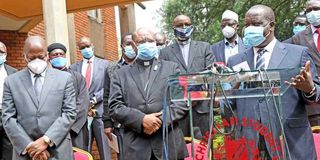Let’s be one another’s keeper to beat pandemic

From left: Health CS Mutahi Kagwe, Nyeri Catholic Archbishop Anthony Muheria and Interior CS Fred Matiang’i with other religious leaders on June 17, 2020 during the inaugural meeting of the Interfaith Council. PHOTO | SILA KIPLAGAT | NATION MEDIA GROUP
What you need to know:
- It is in our places of worship that we are most free, most interactive and, for that reason, most susceptible.
- Our country and indeed the world is in need of divine intervention.
The need to be your brother’s keeper has never had more relevance or been more profound than it is now. The guidelines drafted by the Interfaith Council have contemplated all possible instances of physical interaction in the places of worship and during ceremonies where the faithful congregate.
However, the crux of the matter shall not be found in the letter, but in the spirit of the guidelines.
The spirit of the guidelines calls for each individual to internalise, own and protect the pact that we are all subscribing to. It calls for each one of us to be their brother’s and sister’s keeper, to step up to the plate and be a driver in ensuring that we all do what it takes to keep Covid-19 at bay.
The spirit of the guidelines should be in our hearts and in the motivation we have in taking care of one another. It is in helping one another, sacrificing and encouraging each other in these unique circumstances.
LOVING NEIGHBOUR
What better place to start than in our places of worship? Indeed, it is here we learn to live the great command of loving our neighbour.
And why are our places of worship so special in this fight against Covid-19? It is here that you will find the majority of Kenyans congregating – and the figure is well above 70 per cent of our population every week! This is well above football stadia, restaurants and even public transport. This is a different league altogether.
It is in our places of worship that we are most free, most interactive and, for that reason, most susceptible. It is, therefore, in our places of worship where we must begin embracing the notion of being one another’s keepers.
It is not about maintaining the scientific distance of 1.5 metres, but rather understanding that you are doing so to protect your brother as you protect yourself.
It is here that we are expecting millions of Kenyans to seek solace, comfort and encouragement during these difficult times of lost lives, lost jobs, destroyed livelihoods, shattered dreams, gripping fear, anxiety and hopelessness.
LARGER POPULATION
It is, therefore, prudent and logical to expect that a larger population will be desirous to go to their places of worship. This, therefore, must not be the place that promotes the spread of the virus.
We all remember the unfortunate and much-talked-about “patient 31”, a congregant in a reclusive church in South Korea who is blamed for the rapid spread of Covid-19 in February this year.
That story has to be a wake-up call to everyone on the dangers of throwing caution to the wind.
With such large numbers, our places of worship are well positioned to be the most ideal places for advocacy and spreading the word on curbing the spread of this disease.
Our different religions might be different in the way we live out our beliefs, but all believe in God whom we worship, and a common thread in all is the doctrine of being one another’s keepers.
It is a doctrine that cuts across all ages, all races and all religions. This war can be won if all religious leaders champion compliance through spiritual persuasion.
Our beloved country and indeed the world is in need of divine intervention, but this cannot be sought with blind faith and disregard to the situation we are facing.
The writer is Archbishop of the Diocese of Nyeri and Chairman of the Interfaith Council





